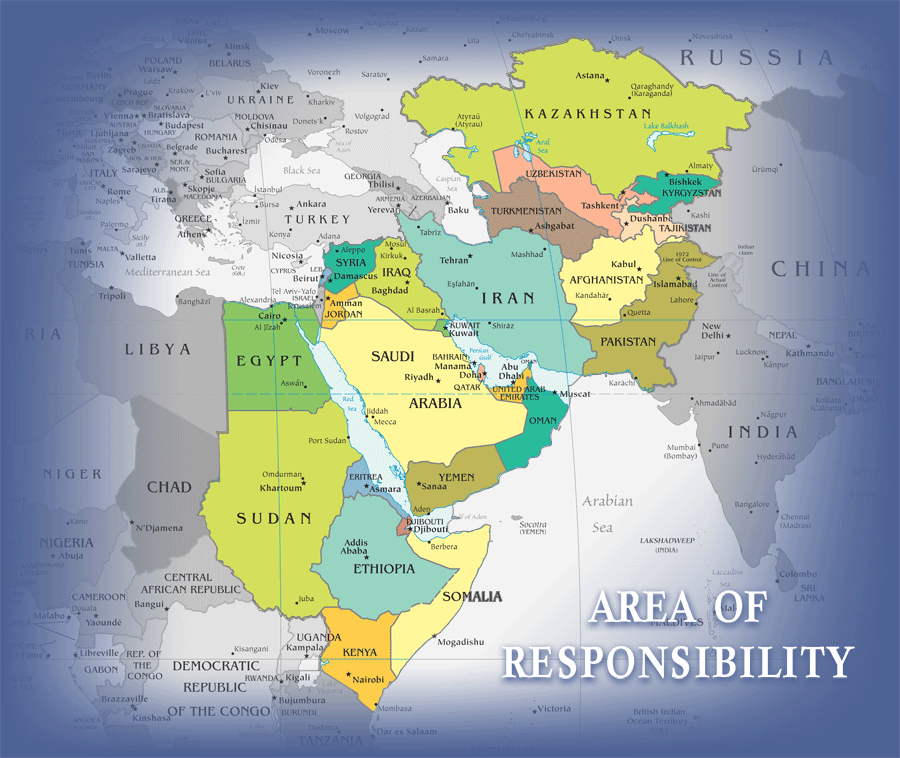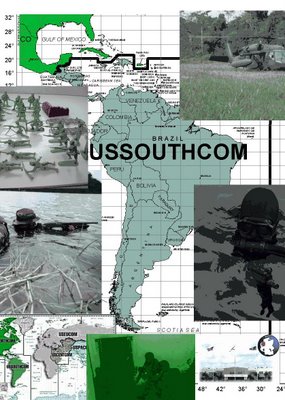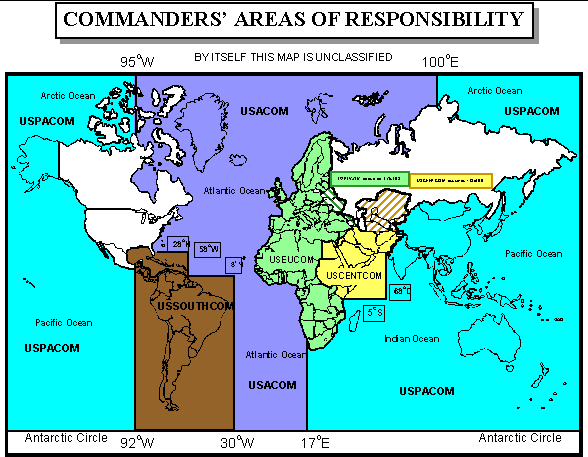(Originally published February 20, 2008; updated, Sept. 14, 2008) In the BBC news article at the bottom of the page, US Shifts on Africom Base Plans, we are told, "... the US has decided to keep its new African Command in Germany for now", after hosting it has been rejected by every African country except Liberia. From Europe (e.g. Italy) and the Middle East - to Latin America and Africa, people are done with living under the shadow of U.S. military bases on their lands. Below, we explore CENTCOM'S US military dominance and some of the reasons they are being rejected by their former hosts in Africa, Latin America and the Middle East.
AFRICOM
Although those in control of the U.S. government have carried out military attacks and covert CIA operations in Africa for decades, last February they unveiled their plan to create a "military command" in North Africa which they are calling "AFRICOM". The name itself is enough to understand U.S. intentions for AFRICOM. It is similar to CENTCOM - the acronym for Central Command which assumes the right of U.S. military intervention in 25 nations that stretch from the Horn of Africa through the Arabian Gulf region, into Central Asia. Currently, CENTCOM's predominate occupation is the war in Iraq. The name is also similar to SOUTHCOM which assumes the same rights throughout Latin America. The name, AFRICOM, communicates an intention to influence, control and dominate and the African people appear to be rejecting AFRICOM.
|

|
|
The world according to CENTCOM |
SOUTHCOM
To understand the composition and purpose of this attempt to dominate Africa, one only has to look at the government's "Southern Command" known as "SOUTHCOM". Origins of SOUTHCOM can be traced all the way back to 1903 when U.S. Marines arrived in Panama "to protect" the Panama Railroad, connecting the Atlantic and Pacific oceans. They remained in Panama "to provide security" for the construction of the Panama Canal. Through the decades, U.S. military presence steadily grew to dominate additional territory under a number of other pretexts and in 1946 the Truman regime placed military control of the region under a single commander.
 |
|
The world according to SOUTHCOM
Photo: Warfare 2050 |
In 1963 the plan for U.S. military domination in Latin America was designated "SOUTHCOM" and the government formally declared all of Central and South America to be its "area of responsibility". When the Panama Canal treaties were implemented in 1977, SOUTHCOM headquarters were moved from Panama to Miami, Florida. In 1996 and 1997 the U.S. DOD completed another plan it named the "Unified Command Plan" (UCP). Leading up to 1997, each change in the UCP added more land to the SOUTHCOM domain. These geographic areas include a number of U.S. and European "territories". They include 13 island nations, currently occupied by the U.S. and Europe, the Gulf of Mexico, and portions of the Atlantic and Pacific oceans. In 1999 an additional portion of the Atlantic Ocean was added to SOUTHCOM's "area of responsibility" and in 2000 the waters adjacent to the northern quadrant of Brazil were added.
 |
|
The world according to the "Unified Command Plan" (UCP) |
Today, SOUTHCOM assumes the right to dominate 32 nations (19 in Central and South America and 13 in the Carribean). These encompass 14.5 million square miles or 23.2 million square kilometers. In the late 1980s, powerful resistance to this U.S. military domination of Latin America began to develop in the people of Venezuela. This resistance has grown under the leadership of Hugo Chavez Frias who was democratically elected president of Venezuela in 1998 and re-elected twice since then. Resistance to U.S. military domination has now spread to other countries in Latin America. For example, Ecuador's president, Rafael Correa, elected in 2007 promised that the country will not renew the 30 year lease that allows the U.S. access to its Manta Air Base when it expires in 2009. The Manta Airbase was opened under a corrupt U.S.-backed Ecuadoran regime in 1978.
Economic Dependency and Military Domination
The U.S. used "protection" of the Panama Canal as a reason to move U.S. Marines there in 1903. It continues to use a number of other pretexts for SOUTHCOM's military domination of Latin America. It claims the Manta Air Base is being used to fight cocaine trafficking. It incorporated "humanitarian assistance and disaster relief programs" to justify its military domination throughout Latin America. It constructed disaster relief warehouses, emergency operation centers, shelters and schools "to promote peace and stability" and developed "civilian infrastructure for economic and social reforms ... [to] improve the living conditions of impoverished regions in its area of responsibility". Meanwhile, the U.S. has created "impoverished regions" in these nations through its exploitation of natural resources and domination of Latin American economies via the World Trade Organization, the World Bank and International Monetary Fund. Thus, economic dependency has become the midwife of U.S. military domination.
Behind AFRICOM
AFRICOM's spokesman, Ryan Henry, is the leader of the U.S. delegation to Africa to sell AFRICOM to Africa. He is the principal deputy undersecretary of defense for policy. Of AFRICOM's mission he stated that "the main mission for the command would be to stabilize weak or poor countries by training local security forces and doling out humanitarian aid." After meeting with Morroccan officials, Henry stated, "It's mostly a headquarters and planning focus. AFRICOM doesn't mean that there would be additional U.S. forces put on the continent." The Washington Post adds, "Defense officials acknowledge that one reason they are paying more attention to Africa is because the continent provides an increasingly large share of the United States' supply of imported oil and natural gas."
| It is also interesting to note that Israel also has a "Southern Command" which it imposes on the Negev (6,700 sq miles, 13,000 sq kilometers), Arabah (103 square miles, 166 sq km) and Eilat, rich in marine resources and favored tourist site on the Red Sea - all in the name of "security" in ravaged Palestine. |
In 2001, the U.S. created the "perfect war" for military domination anywhere in the world - the war that knows no temporal or geographic boundaries - the "war on terrorism". It assumes the right to attack with bombs, missiles, troops, economic sanctions or covert operations - anywhere it can dig up a "terrorist". In the last few weeks it uncovered a spurious "terrorist cell" to justify putting U.S. military in the nation of Guyana. The corporate media ramped up fear of a terrorist plan to blow up Kennedy Airport - providing support for this insertion of U.S. military in this sovereign nation on Venezuela's northeast border. In the case of AFRICOM, according to the Washington Post, the U.S. government has "touted the new command as a key part of their strategy for countering terrorism threats on the continent". The Post continues, "Al-Qaida-affiliated groups have experienced a resurgence in North and East Africa in recent years."
The People's Resistance
As in Latin America, the resistance to U.S. agression in Africa is first and foremost coming from "the people" - and not the regimes under which they live. Rachid Tlemcani is a professor of political science at the University of Algiers and also a scholar with the Carnegie Endowment for International Peace (a Washington-based organization that also supports the wealthy, minority opposition in Venezuela). He indicated that the rejection of AFRICOM "was a reflection of public opposition to U.S. policies in the predominantly Muslim region". Tlemcani stated,
"People on the street assume their governments have already had too many dealings with the U.S. in the war on terror at the expense of the rule of law ... The regimes realize the whole idea is very unpopular."
The peoples of North Africa are students of history and their parents didn't rear fools, regardless of the racial stereotypes cultivated by western propaganda. They have learned from other U.S. occupations and regional dominations of the world including Latin America and the Middle East. The beast's smile has turned to a grin and baring its fangs in Afghanistan, Iraq and Palestine, it is bleeding itself dry, both economically and militarily. Revealing its true nature, it has underestimated the intelligence of "the people" and opened the door for formidable world-wide rejection and even military resistance. One of the U.S. government's mouthpieces, the Washington Post, opens it's news report of Northern Africa's rejection of AFRICOM with the following line: "Nations in mostly Muslim region are reluctant to host military command". So according to the Post, the U.S. plan is rejected by Algerian and Lybian "Muslims" - not the peoples of North Africa. But the WP article also laments,
"Morocco, which has been mentioned as a possible site for the new command and is one of the strongest U.S. allies in the region, didn't roll out the welcome mat, either."
You bet the 4th World War is being played out, fought out in these post 9/11 years. It is a war between those in control of governments and the people who are realizing their own power. As responsible citizens of the United States we must do everything in our power to stop our government's international aggressions, not only for the sake of those being exploited and dominated in foreign lands, but also for the survival of our own civil rights, our economy and ironically for the survival of our own national sovereignty.
© Copyright 2007 by AxisofLogic.com
http://axisoflogic.com/cgi-bin/exec/view.pl?archive=156&num=24801
Sources:
U.S. Southern Command
USCENTCOM
U.S. Dept. of Defense
Warfare 2050
Joint Force Quarterly
US Army War College
US Dept of State
Washington Post
MSNBC
Axis of Logic
US military presses its spearhead into strategic Triple Frontier
U.S. Military in Paraguay Prepares to "Spread Democracy"
Ecuador: President Gutierrez on the brink
International Conference for the Abolition of Foreign Military Bases
US Military Base in Ecuador Shrouded in Corruption
Wikipedia
Biography and additional essays by Les Blough
This article is available for republication for any non-commercial use: verbatim copy of the translation in its entirety may be freely reproduced, respecting its integrity and citing the author and original source.

